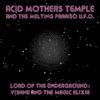 Kawabata Mokoto and his spacey pals have dispatched another communiqué of shambling kitchen-sink psychedelia from whatever mental place they currently inhabit. As is often the case with this band, I am left scratching my head and wondering whether Kawabata is a genius or a charlatan (or both).
Kawabata Mokoto and his spacey pals have dispatched another communiqué of shambling kitchen-sink psychedelia from whatever mental place they currently inhabit. As is often the case with this band, I am left scratching my head and wondering whether Kawabata is a genius or a charlatan (or both).
I used to be a fairly devoted Acid Mothers Temple fan, but I stopped buying their records a few years back because they all started to sound the same to me. Occasionally, an album would stand out as particularly great (La Novia, for example), but many releases seemed like interminable half-baked jams that had swooping and burbling synths piled on to make them "trippy." Of course, Kawabata has a singular knack for twisting seemingly uninspired pseudo-krautock jams into kaleidoscopic supernovas of weirdness, so I could never completely dismiss them. Regardless, it's been a while since I've last checked in and Lord of the Underground... shows me little has changed (for better or worse).
The opening track ("Eleking the Clay") begins rather deceptively with some droning organ before launching into something that resembles a crazed Turkish folk music ensemble that has been handed electric instruments and dosed with LSD. The galloping central riff is rather intricate and cool, but the song's frenetic tempo and absurd hooting vocals make it extremely hard to take seriously. However, the song gradually becomes less and less of a ridiculous caricature of some vague ethnic folk tradition and instead becomes increasingly purposeful and impressive as Kawabata's studio tweaking steers it into a lysergic black hole. The main riff remains relatively unchanged, but all hell breaks loose around it as a spacey analog synth solo unfolds. The tempo continues to increase until even the backbone riff collapses and only a wake of sculpted chaos is left.
Unfortunately, that incandescent flameout is followed by "The Sorcerer's Stone of the Magi," which is decidedly not the band's finest hour (or best song title). Written by bassist Atsushi Tsuyama, this piece is conspicuously different from the rest of the album in being minimal, acoustic, and folky. However, it still features the Mothers' omnipresent electronic ambiance, which sounds anachronistic and tacked-on in this context. Alien8 described this track as "a gentle piece of outsider folk," and that may be so, but its formlessness and mumbled, warbling vocals consistently confounded my repeated attempts to enjoy it. It is mercifully brief though.
The final track is the album's namesake and presumed centerpiece and it covers a lot of territory over the course of its 25 minutes. It begins with some heavily reverbed guitar noodling, sitar, and wordless vocal whooping, growling, and laughing...and, of course, the inescapable trippy swooping electronics. After more than three minutes, the bass and drums finally cohere into a languid groove, which provide a solid foundation for the...ahem...lengthy kazoo solo that follows. Gradually, the drums pick up the pace a bit and the lead guitar becomes more pronounced (there's still more kazoo though). Notably, by the time the song reaches even this minimal degree of progression, roughly ten minutes have elapsed. Thankfully, the next 15 minutes is devoted to a somewhat inspired freak-out: the drums continue to speed up, the bass gets louder and busier, layers of electronics and wah-wah guitars are piled on, and Kawabata artfully mixes it all into some characteristically explosive mind-bending chaos. There are some spectacular moments lurking within the resultant maximalist maelstrom, but this track could have been an unqualified brilliant success if some liberal editing had been undertaken.
Amusingly, my first reaction to this album was exasperation and visceral hatred, but after listening to it several more times, I have decided that it is not a bad album at all when taken on its own merits. Perhaps even good, as I suspect I would've been very impressed if this had been the first AMT album I had ever heard. That said, Lord of the Underground absolutely cannot withstand close, sober scrutiny and suffers greatly from predictability and a meandering lack of focus when compared to the Mothers' previous works. Of course, Kawabata's stated artistic intention is merely to create "extreme trip music" and he has done so rather decisively here. I just wish he would surprise me a bit more often.
Samples:
Read More

